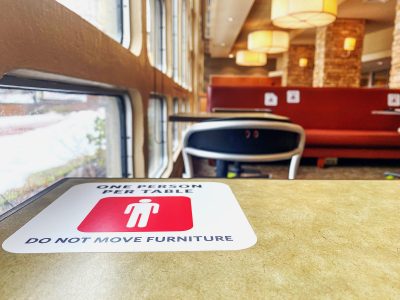
Boston University removed household seating options from all BU Dining Halls last week. Students are now only allowed to eat meals at single-occupancy tables.
Household seating options were meant for students to sit down and dine with members in their specific “household” — such as roommates and floormates. The change in seating availability comes during a general downward trend in COVID-19 cases on campus in recent weeks.
BU spokesperson Colin Riley said the decision was made out of concern regarding students’ interactions with each other.
“One of the problems with COVID is appropriate socialization, that’s the only thing I can say,” he said.
Riley said the University is taking extra precaution by removing household seating and the University will reassess this decision later in the month.
“Let’s have a precautionary pause, reassess it,” he said, “and we’re taking the best advice and guidance from both internal and external epidemiologists and CDC and state and city guidance on all of our public health measures.”
Students say the removal of the household booths in dining halls is a disappointment to those who took advantage of the policy and socialized with members of their inner circle.
Jasmine Garcia, a freshman in the College of Arts and Sciences, said she does not agree with the decision to remove household seating.
“It’s kind of our only form of socializing right now,” she said, “to go and meet up with someone in your household group.”
Garcia said she didn’t understand why dining with roommates or floormates in the dining hall is considered dangerous when students share living spaces and a bathroom with the same group of people.
“Now I won’t be having food as much with my friends that live two doors down from me,” she said.
Angelina Marrero, a freshman in Sargent College of Health and Rehabilitation Sciences, said she is a Bay State Road resident and usually walks to Marciano Commons for meals. She said the lack of seating options could affect her ability to eat inside the dining hall.
“I usually eat in the dining halls, especially because it’s winter,” Marrero said, “and I don’t want to walk outside and eat outside because it’s super cold.”
Marrero said the removal of seating in the dining halls is counterproductive because it will force students to eat in unsafe places both on and off campus.
“If we’re not eating in the dining halls,” she said, “we’re going to be going out with our friends who are also from the BU community and we’re going to be eating out and things like that.”
Marrero said she feels comfortable eating in the dining hall with other BU students because of the precautions and strict rules put in place by the University.
“I do feel comfortable because I know everyone around me is getting tested three times a week,” she added. “These people are part of the BU community and it’s less likely that they do have COVID because BU already has strict rules in place.”
Marrero said the University could have handled the situation with a more gradual approach instead of immediately taking away household seating.
“I feel like they could have approached it a different way,” she said. “Like stricter enforcement, maybe writing people up or giving out warnings, something that would have led up to it being completely taken away.”
Some students said they feel excluded from the University’s decision-making process and believe the student body should have been able to give their input on the matter.
College of General Studies freshman Mariam Hydara said she ate in the dining hall at the beginning of the semester, but now eats in her room since the seating change went into effect.
“I just wish it would have been maybe more of a community decision,” Hydara said, “because it does change a lot.”
Hydara said household tables in the dining halls aren’t a big difference in terms of exposure when compared to eating in a dorm with a roommate.
“If you live with someone, then there should be no difference if you are eating with them,” Hydara said. “You guys are literally with each other all the time.”
Derek Wagher, a CGS freshman, said he agreed with BU’s intentions but does not believe removing all household booths is the best approach.
“I think they were right to try to limit the seating in the dining hall more because people were kind of bunching together more than they should have been,” Wagher said. “But I don’t think that completely removing all of the booths is the way to do it.”
CAS freshman Taelor Anderson said she agrees with the removal of household seating areas because she said many students were not following the rules.
“A lot of people were not following the COVID guidelines and so it was becoming unsafe,” she said. “I think that if the rules were followed correctly that they would be safe enough. However, people aren’t actually sitting [with] other members of their households.”
Anderson said she often sees students breaching the maximum number of people allowed in a booth and sitting with people who are not in their household.
“There were a lot more people sitting in those booths than there were supposed to,” Anderson said. “They were supposed to be three to four people and there were groups of five to eight people sitting in the corners, trying to hide from the workers.”





























































































































